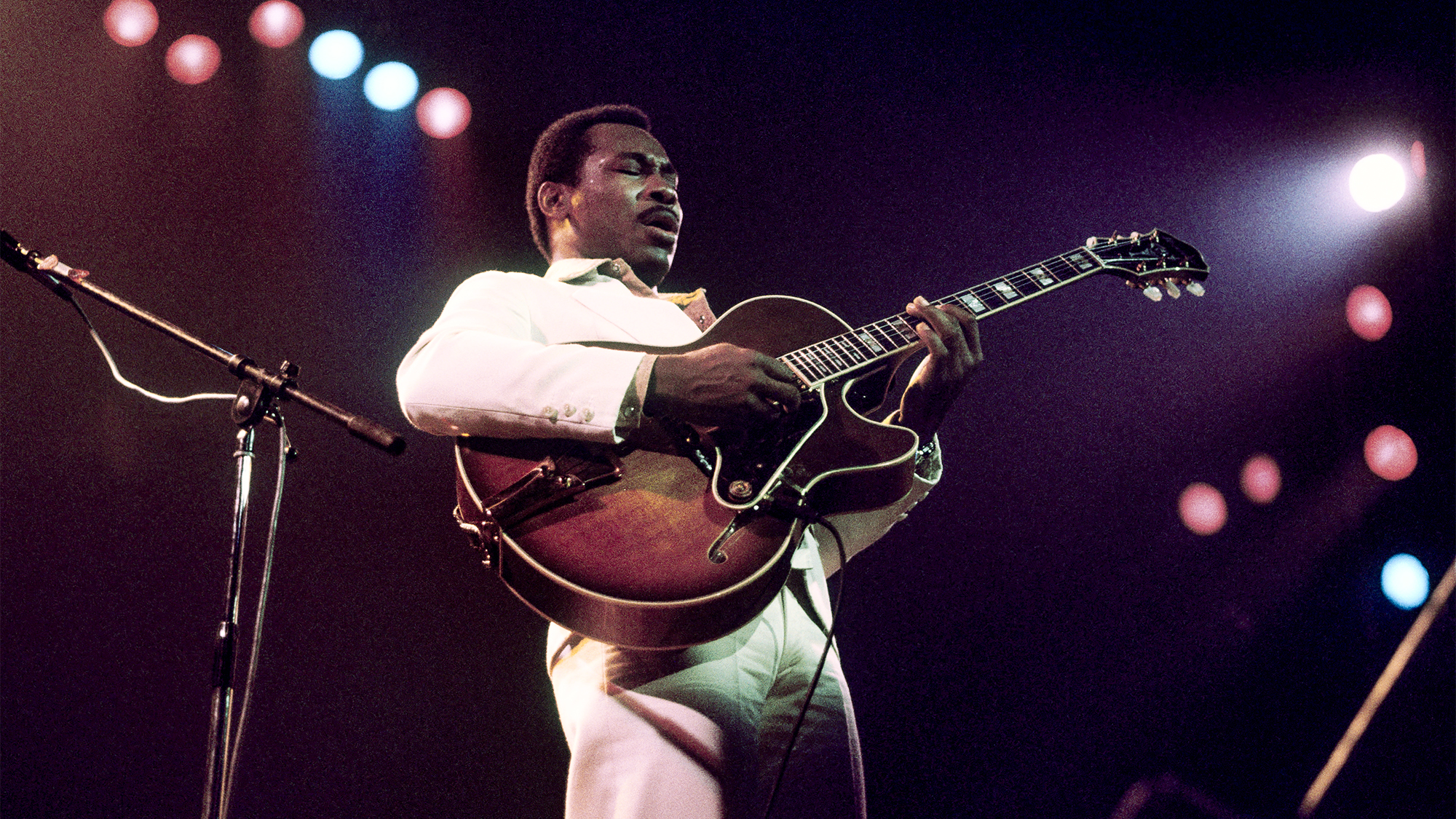John Lee Hooker: "Out of the Younger Generation of the Blues Singers, Who Was My Pride and Joy? Stevie Ray Vaughan... He Could Do Anybody – Albert King, Jimi Hendrix, George Benson – Anybody's Thing. I'd Sit Down and Watch Him Do That"
The bluesman who Miles Davis once described as the "funkiest man alive" discusses his love of B.B. King's signature Gibson, his most beloved Fender amps, and the guitarist who came closest to his style with GP in this 1992 interview.
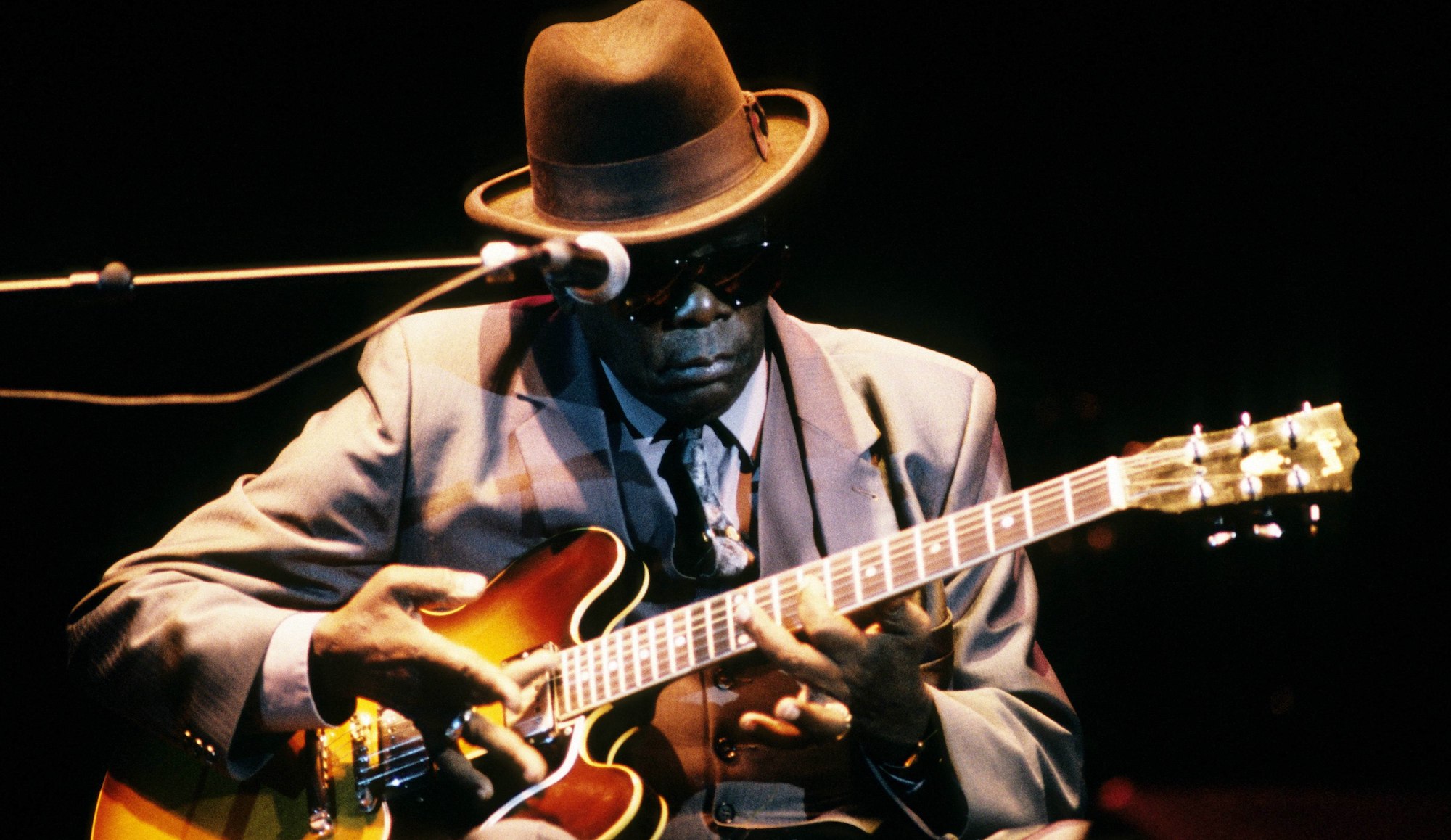
All the latest guitar news, interviews, lessons, reviews, deals and more, direct to your inbox!
You are now subscribed
Your newsletter sign-up was successful
This interview originally appeared in the August 1992 issue of Guitar Player.
"Ain't a lot of chords to it
It's just a big beat
And I sound just like a whole band
Now you dig it, and dig my feets."
– John Lee Hooker's "Teachin' the Blues," 1961
Our search for the big beat led us to John Lee Hooker's house in Redwood City, California. At 72, Hooker can proudly look back on a career that began in Clarksdale, Mississippi, during the 1930s. Unlike his contemporaries Muddy Waters and Robert Johnson, Hooker didn't play roll-and-tumble Delta jukes, choosing instead to launch his career in Memphis, singing gospel and blues.
He moved to Detroit after World War II to work by day in an auto plant and make the rounds of Black Bottom clubs by night. 1948's “Boogie Chillen',” his first R&B hit, inaugurated the most prolific recording career in postwar history (It's estimated that between 1949 and 1953 alone, Hooker cut some 70 singles on 24 different labels, using a dozen different names to avoid contractual problems).
Other big R&B hits followed: “Crawlin' King Snake” in '49, “I'm in the Mood” in '51, and “Dimples” in '56. Hooker made his first foray into Europe in '62 and returned to find that “Boom Boom” had become his first crossover hit.
Covers by the Animals and other British Invasion bands helped him win white audiences at home. Since then, Hooker has moved to California, recorded armloads of albums, and associated with some of the most respected names in rock and blues.
As it was in the beginning, so it is today: The very heartbeat of John Lee Hooker's music remains his unique songwriting, powerful voice, and down-home propulsive guitar.
All the latest guitar news, interviews, lessons, reviews, deals and more, direct to your inbox!
Like Muddy Waters, Lightnin' Hopkins, and very few others, he remains a musical law unto himself, still specializing in the sparse blues and infectious boogies that first rocked the globe more than 40 years ago. As Miles Davis expressed it after a 1990 session, “John Lee, you the funkiest man alive. You sound like you buried up to your neck in mud!”
Mr. Hooker received us graciously, sat us on his couch, and tuned his electric guitar to open A. He quickly launched into an instrumental version of “Boogie Chillen',” each foot tapping to a different beat.
It's just boogie. Just go on with it. I don't need drums
Watching you play “Boogie Chillen'” close up, it seems like what you're doing is very simple, and yet it's very difficult for others to get it right.
“For me, it's simple, but... [laughs].”
That was one of the first songs you recorded.
“Uh-huh.”
Did you write it when you were a young man in Mississippi?
[Nods yes].
How are you counting time with your feet?
“I couldn't tell you. It's just boogie. Just go on with it. I don't need drums.”
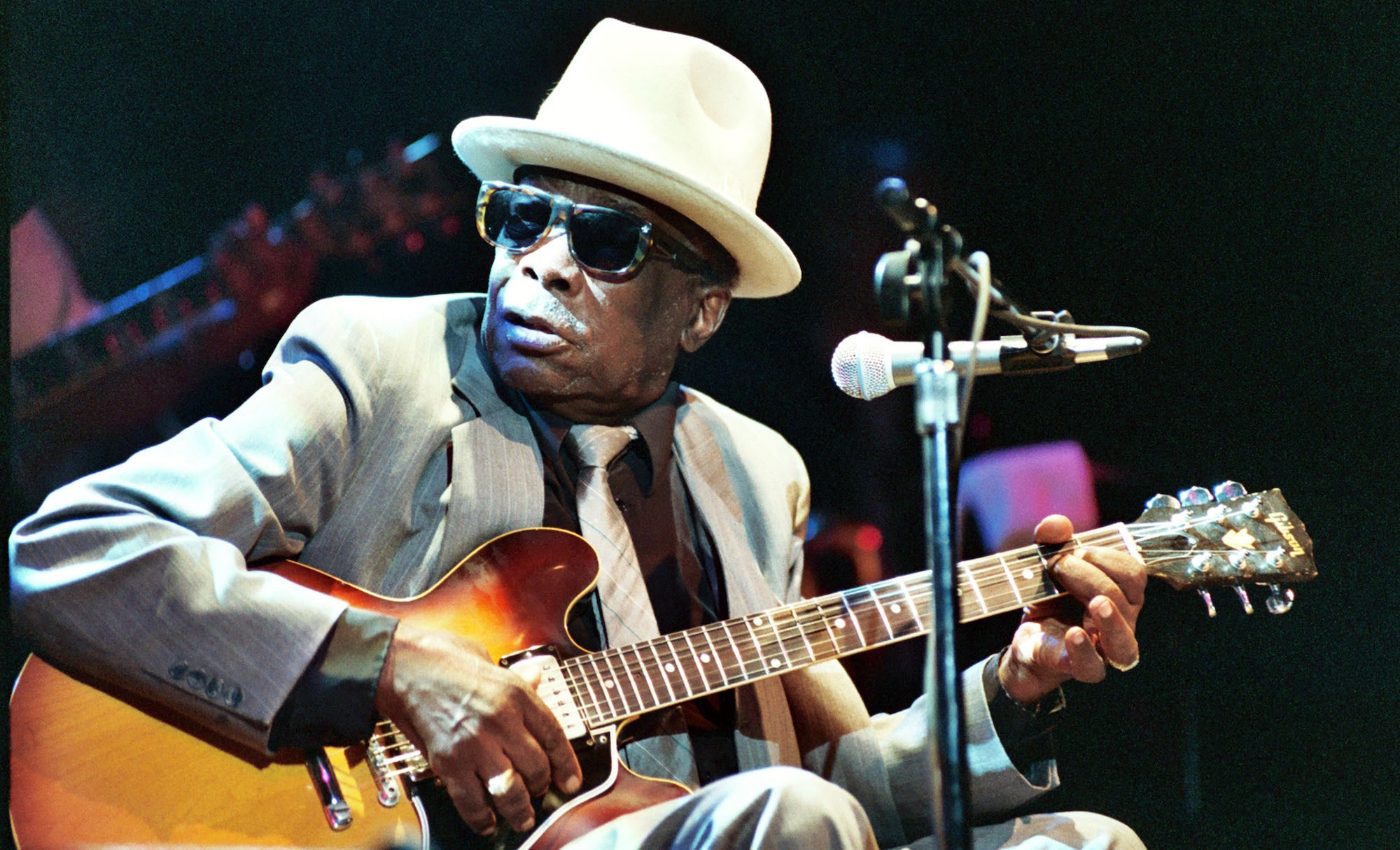
You often played that way in Detroit, using your feet instead of a rhythm section.
“Yeah. That first came from my stepfather, Will Moore, from whom I learned to play when I was 13. John Hammond does it too.”
Do you usually keep your guitars tuned to a chord?
“Not really. But I use open tunings. 'Boogie Chillen',' that's in open A. For 'Boom Boom,' I've got to retune it.” [Ed. Note: Rich Kirch, John's backup guitarist, details: "John plays almost everything in open E, except for 'Boogie' – for that he usually tunes three strings up so he's in open A."]
What do you look for in a tone?
“I look for a deep, gutty feeling. I don't use picks, so I can get that deep gut feeling. People ask, 'How do you get that?' It's just there. A lot of people try to play real fast chords – da da da da da – that's not the blues. It's synthetic. It ain't the hard, solid blues. It's a lot of speed and everything. It has no feeling to it.
“You've got to sit down and play some [whispers] funky, funky guitar. Take your time! Don't rush it. Just let it come flowing through you. I can play guitar so funky, until it brings teardrops to your eyes. It has that funky, funky tone. I'm just me.”
While most musicians stick to 12-bar blues, you seldom follow that format.
“That's for the birds. People just feel – that's the way the blues is supposed to be played. Shut your eyes, and then you'll know what you're doing. I know what notes to hit. I know what notes not to hit. I can do a 12-bar perfect – perfect. Oh, yeah. If I did, then I wouldn't be John Lee Hooker. See, I'm known for not doing it. When I'm just playing to myself I do it – 8, 12, 4, 16, 24. But ordinarily I don't do it, because it would take away a lot of my feeling.
“You cannot learn this in a book. You feel it here [points to his heart and head], not by writing on a piece of paper. Throw that paper away! When I walk into a studio, I don't need all that stuff. I can go into a studio and in two hours' time I can record five or six songs. Sometimes it take some people three or four weeks to record one or two songs!”
Sometimes it takes a band years to make one album.
“Yeah, It does! I can make ten albums in a year, and they all come out perfect, too.”
Can you make up songs on the spot?
“Yeah. They're on the spot. I get that good feeling. But one thing I don't like – what really bugs me – is anybody telling me how to play, what to do and how to do it. Don't do that.”
That 'Boom Boom,' that 'Dimples' – turned a whole generation. It went to Europe, and then come back here and turned the whole universe on
Has that been a problem on your recent Chameleon and Charisma albums, since so many of the songs feature guest bands? When you recorded with Santana, for instance, you were working in a pretty straight format.
“Heavy duty. We get together on it. They know how I do it. With 'The Healer,' we did two takes – it came out perfect. 'Stripped Me Naked' [laughs].”
What were you thinking when you wrote that?
“Well, I got stripped naked once. She took the house, the Cadillac. And the money in the bank – she took that too.”
Did Carlos come to you with the music for that song?
“He came to the house, and we sat around. Like, he talked and we would just go with things. Just me and him. I'd go to his house, we'd lay the foundation, and then he'd pass it on to the guys. And it comes out perfect every time. 'Stripped Me Naked,' that took just about two takes.”
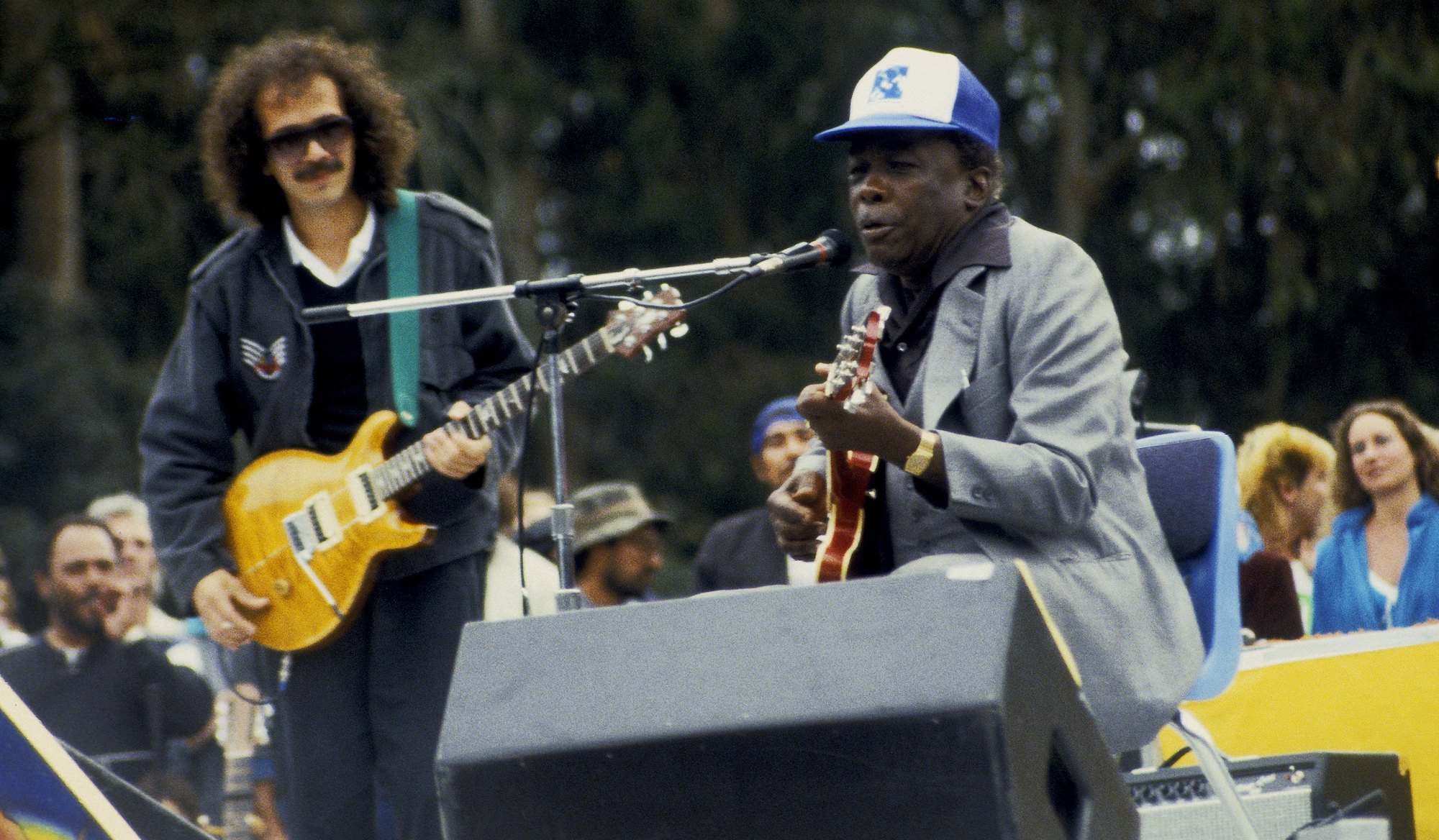
Have your recent albums had a big impact on your career?
“Very, very big impact, because they were all-stars. But this one I got coming out now, I'm not going to have all-star everyone – just me and my band and some local people. Carlos will probably be on it. We already got a thing called 'Chill Out' on the shelf, so we'll probably use that.
“I'm in the studio now working, getting some pretty good stuff. A lot of the stuff I did a long, long time ago, which is new to the kids now – some of my classic stuff. But the kids never heard it, so I'm doing it over. I always did want to do it that way. Now that I got a chance, I'm going to do a lot of it all over, like 'Sugar Mama,' 'Boom Boom,' and 'Dimples.'”
Those songs turned a generation of kids on to your music during the 1960s.
“That 'Boom Boom,' that 'Dimples' – turned a whole generation. It went to Europe, and then come back here and turned the whole universe on. Then different artists took to doing that song, 'Boom Boom' – Bruce Springsteen, all them. Big Joe Turner, he was doing 'Dimples'.”
Is it a compliment when people try to play like you?
“Yeah, it is. Because I know I'm doing something to be loved. If he didn't like it, he wouldn't try to do it! So it's very complimentary to me.”
Some guys feel very protective...
“Not me. I love people that do my stuff. Robert Plant, he did 'Dimples'. He sings it all the time. He's one of my favorite people. Nice guy. Every time he comes over, he tries to look me up.
“He flew me out to New York once to meet him, paid for my hotel and everything. Had a lady with him called Big Maggie Bell from Scotland. Met her. But my hero is Bonnie Raitt. Me and her are just like this [holds two fingers together]. I guess you know that. We're real close. I've known Bonnie over the years, and I'm a guest on her tour in LA.”
A lot of your old material has recently come out on CD.
“Yeah. You know they're coming out now because we're doing big things. They're just throwing out everything now – boom. Rhino Records did one.”
That has many great tracks, but it's missing “Mad Man Blues.”
“Yeah. Oh, I love the 'Mad Man Blues'.” [Claps time and sings 'I love the Mad Man Blues' and 'I'm Gonna Kill That Woman' to the original melody].
Do you play blues when you're alone?
“Yeah, around the house I do. Yeah, I sit down in my room and just go with things I want to do, some of that old stuff that I'm trying to revive again and bring back.”
Do you work on your own guitars?
“No. The little light stuff I do, like adjusting the bridges and raising the saddles. You get beyond that, no.”
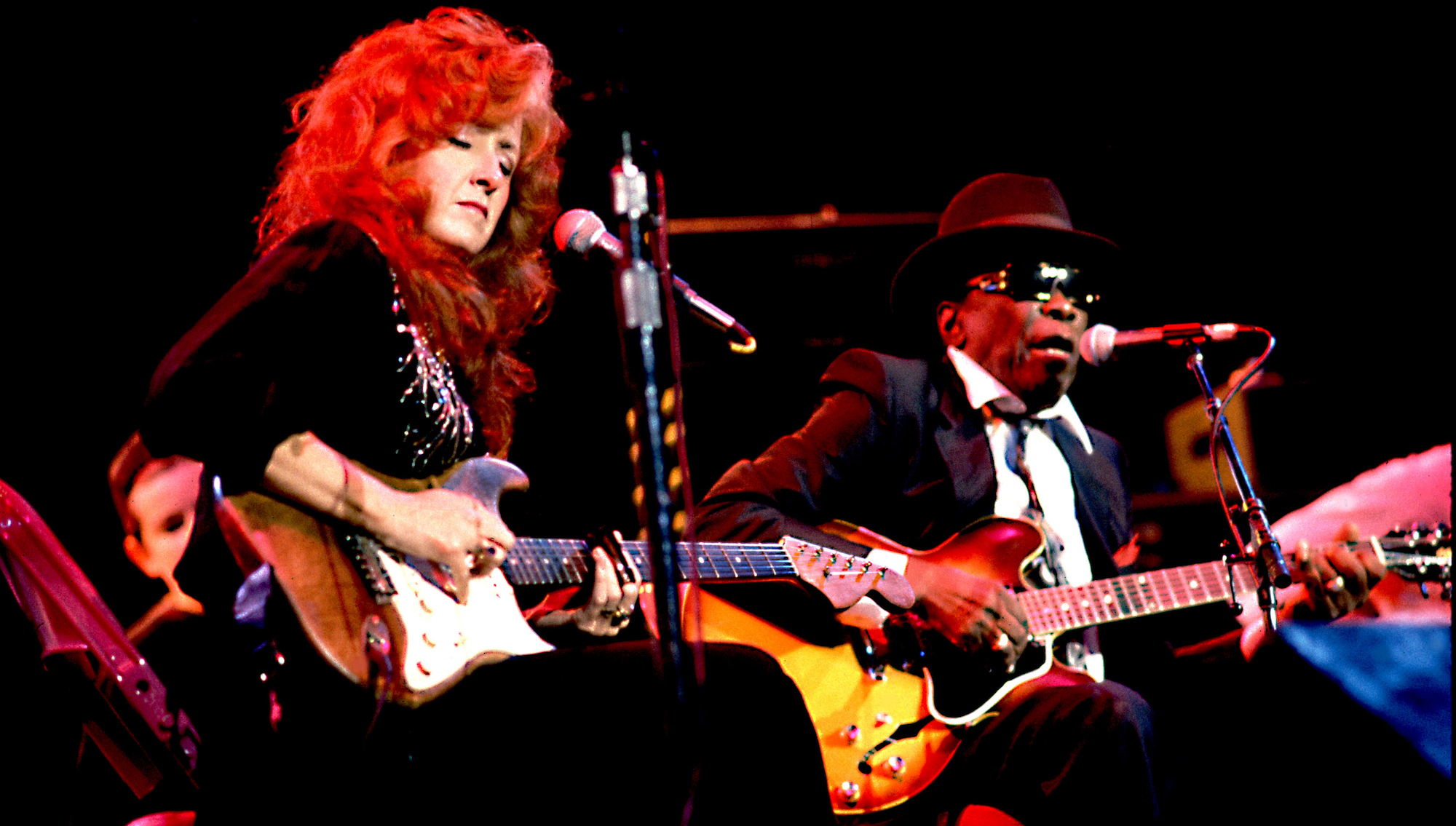
Why do you play semi-hollow guitars?
“Well, I like 'em. You've got to do that now because the generations come and go, and the young generation, they like to dance and they want it loud. But you still can make funky loud.”
You could play a Fender.
“I could, but I don't want to. I'm plainspoken and I don't want that. This is what I like. You don't have to bring me around the bridge. This is what I like – boom. I like the tone. I always did like Gibson. Even the old-style ones.”
Why do you have a guitar with B.B. King's name on it?
“I saw it and I went and bought it. He's an old buddy of mine. I said [to the salesman] 'Give me that one.' He gave me the price – he said, 'It's a lot of money.' I said, 'I don't care. Just give it to me.' He said, 'Who are you?' I said, 'I'm John Lee.' He said, 'Oooh,' and he came down on the price when he found out who I was. I was signing stuff in his store.”
What's the greatest amplifier?
“I know who's got the greatest name – Fender. I've got one sitting right there [points to an old Concert]. I've got another one back there, man, a Bedrock – boy, that thing is powerful! Whoo. It's not famous, but oh, it's powerful. But Fender is a brand name, and it's the name that sells, and it's what people go for.”
How do you set the amp controls?
“Different songs, different settings. I don't like it real sharp. I like it kind of medium. Not too much bass, not too much sharp.”
Do you like reverb?
“Not really. On some of my new stuff I did. About two weeks ago, I put reverb on a couple of my really funky tunes, like 'Sugar Mama.'”
Carlos Santana says a man's tone is his face.
“He knows.”
Albert Collins' tone, for instance, is spiky and sharp...
“It is. Oh, it's a thousand miles apart from mine. It's good, but it's his thing. You're talking a different world.”
Out of the younger generation of the blues singers, who was my pride and joy? Stevie Ray. I know that kid – I used to go around Austin, Texas, before anybody knew about Stevie Ray and Jimmie Vaughan
Do you like B.B.'s tone?
“Whoo, Yeah! Are you kidding? Oh, yeah. My old buddy. And Albert King is funky! He puts that pipe in his mouth and rears his head back. He's a good man, and he's going to do things his way or no way! [Laughs] He's working on his own bus right now.”
You've used some of the same backup musicians for many years now.
“Oh yeah. My guitar player Rich is nice, nice. He's a good guy! Boy, that guy loves me and I love him. I'm the one that brought him to California. He'd been in Chicago all his life.
“I've known him about 12 years. I got the guy a ticket, brought him out – he's been with me ever since. I talk to him every day. He's a heck of a nice guy and a good guitar player. Jim Gayette – oh he is funky! He's a funky bass player, and funny too. He keeps the band laughing all night.”
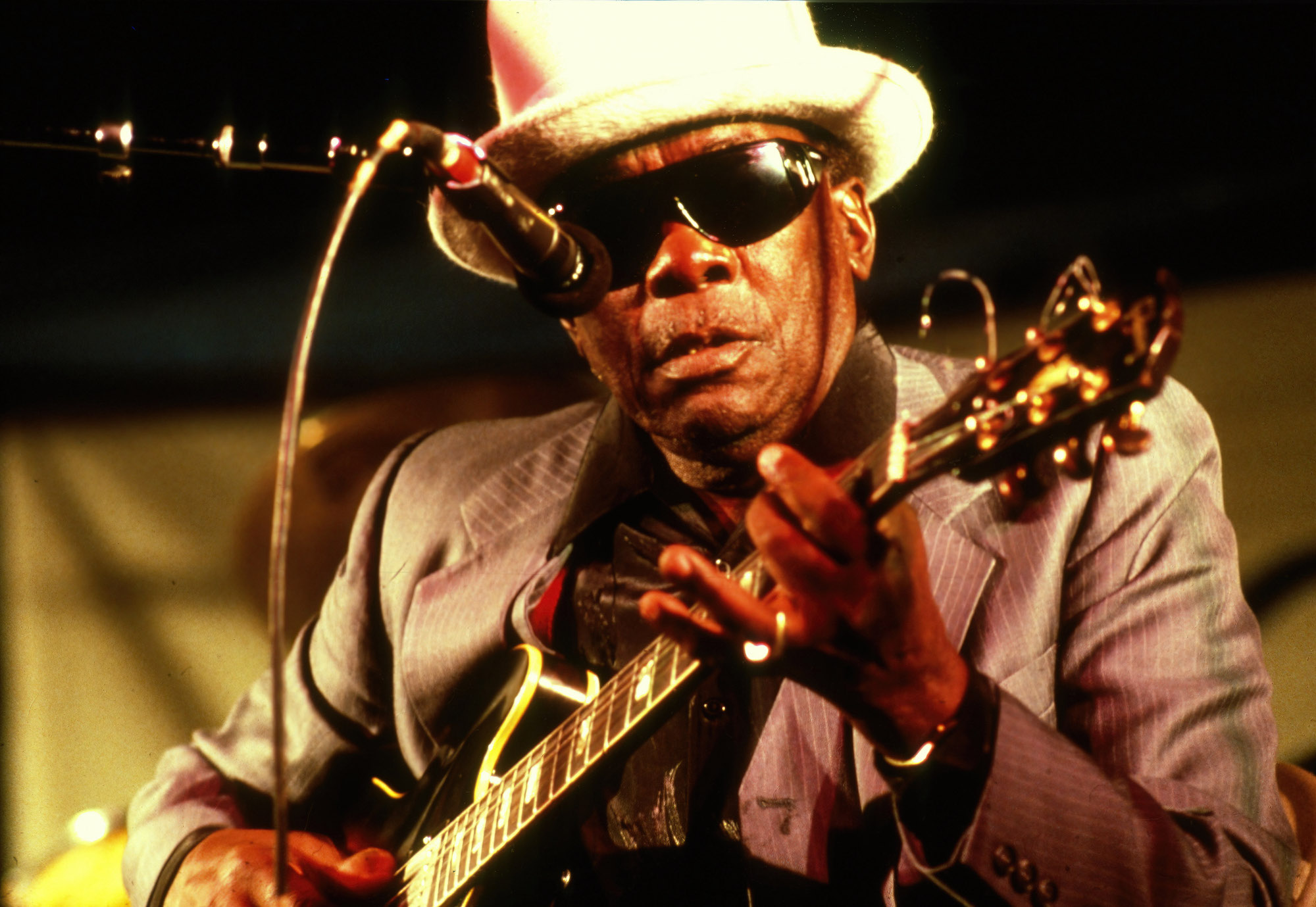
When you were starting out, would you play for a long time at night?
“Before I became famous? When I was a kid? If my parents would let me I would.”
You hear about guys playing in Delta juke joints from nightfall until morning...
“No, I didn't do that, no. I would've, but I didn't [Laughs].”
What was Hastings Street like when you first came to Detroit?
“That was the best street in town. Everything you wanted was right there. Everything you didn't want was right there. It ain't no more now. It's a freeway now – Chrysler Freeway. But that was a good street, a street known all over the world. But I didn't just play on Hastings – I'd play any club on Russell, Chene, Jefferson... In those days, I was so into my music, but I had to work to survive. I was a janitor – I pushed a broom.”
What do you remember of your sessions at United Sound Studio in Detroit?
“On West Grand Boulevard and Second? Still there. I would always use my amp, just plug into my old funky amps – an Ampeg or a Silvertone.”
Was your first electric guitar the Les Paul you're seen with in some of the early pictures?
“It was. Really good one. Before that I had some round-hole pickups [for amplifying an acoustic guitar]. No, T-Bone Walker gave me my first electric guitar. Then I thought that was the best I ever seen. It was an Epiphone archtop.”
Did you use an acoustic for early sides like “Mad Man Blues”?
“Yeah, that's acoustic. I had an old Stella with a pickup called DeArmond, and it fit across the soundhole. You slide it in. I thought at that time it was a great, great sound.”
Was Newport '63 your first big concert?
“Never been so scared! My first big concert, yeah. Couldn't get my body to stop shaking!”
You appeared with Muddy Waters there.
“Yeah. I was good friends with Muddy.”
Do you have any favorite memories of him?
“Yeah, I do. I've got so many I couldn't tell 'em all. He'd come to Detroit, he used to stay at my house. I had a big house in Detroit. Matter of fact, I own property there now. He never would stay in a hotel. Him and Jenny, his wife, would stay at my house. Little Walter would be with him. He was a sideman then, one of the greatest harmonica players ever lived.
“We would go on tour together sometimes, me and him and Little Walter, Jimmy Rogers. Remember Jimmy Rogers? He had this old Oldsmobile, brand-new. And Little Walter was crazy, and he used to drive. Speeding in it. And he'd be laughing because I'd be nervous. Just a lot of good memories, things I cannot ever forget. Muddy was a really good man. And he was just beginning to come into it, like I am now. Just beginning to climb up the ladder really high.”
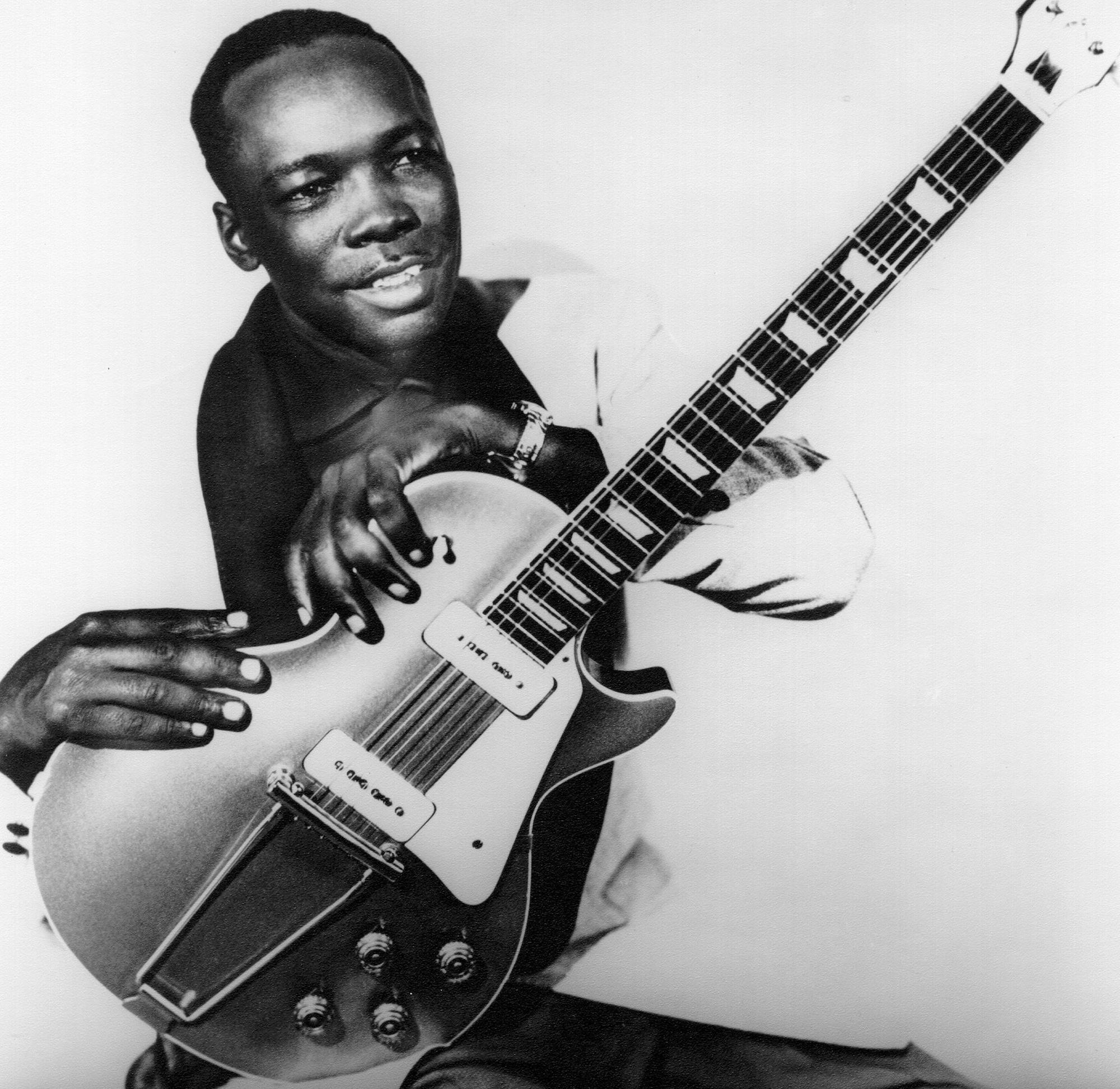
His last four albums were terrific.
“They were. He was beginning to climb up to the top, and it's a hard climb. But, you know, you get there somehow. Some get there and some don't. I'm one of the few giants at the top of the ladder. In my traveling and living in God's world, I love people. My heart go out for people. I'm just a softy. I just give my heart to people, and how can I say no to the people that I know I should? I don't like hurting people.
“We all like money, don't get me wrong, but it's not the greatest thing in the world, though we have to have it. Friendship, love, peace of mind, and health are the greatest things in the world. You have to have money to survive, but – and a lot of us do – we can't let money get in the way of friendship and love and the people that put you where you are. People put me where I'm at today. If it weren't for those people, John Lee wouldn't be sitting on top of the ladder – I'd be sitting down below.
“And who put me there? The working people – people go out and work five or six days a week, and come out to see me and buy my albums, and stuff like that. Young kids. Old people. They're the people that got me there. Some stars seem to forget the people that blazed the path for them, the people that put them there. If there wasn't any people, you wouldn't be there.
“I love to go into little clubs, funky bars, and get up there singing. I walk into a lot of little clubs, and they're surprised to see me in there. They say, 'What're you doing in here?' And I say, 'I'm just like you. I'm here to have some fun and get down with you.' I don't think about the fact that I'm a big star, or that I have money. I don't think about that. I'm out there at a place where I like to get down and have a beer with you. I don't look at myself as a big star. I really don't.”
Who were some of the other bluesmen that you enjoyed playing with?
“There are so many of them. You sure got me on the spot there. But really I enjoyed playing with Muddy when we did the Whiskey A Go-Go – me, Otis Spann, and Muddy Waters. Oh, so many it's hard to say.”
What's your opinion of Otis Spann?
“One of the greatest blues piano players ever. And a good man too. Loyal, friendly, no ego, no nothing. Just a perfect gentleman.”
Who would you consider the great slide players?
“Well, I would say Ry Cooder. He's one of the greatest. I had a cousin, he's gone now, but he was pretty great – Earl Hooker. He was a monster. Nobody could beat him. I got some of his stuff here now, man. We used to work together a lot over the years. Boy, he used to make a wah-wah talk and slide along with it. I've got that album here now, with Fred Below on drums. It's real funky.”
Have you ever played slide guitar?
“I have messed around with it. I could play slide, but I wouldn't be very good. I used to play a little harmonica and drums.”
Did you ever see Elmore James?
“Once, in Chicago. I went to his hotel where we sat and talked. He was a nice man. A lot of people copied him too, a lot of people.
Who is your favorite younger blues singer?
“Out of the younger generation of the blues singers, who was my pride and joy? Stevie Ray. I know that kid – I used to go around Austin, Texas, before anybody knew about Stevie Ray and Jimmie Vaughan. Every time I go there, he sits in and plays.
“We used to talk. He used to come to the dressing room, come to my hotel room. To me, he was one of the greatest young blues singers. He could do anybody – Albert King, Jimi Hendrix, George Benson – anybody's thing. I'd sit down and watch him do that. He had his own style – he did, definitely – but he could play anything else anybody could play. He'd say, 'I'm gonna play you now,' and he play me. And if he can play me, he can play anybody!”
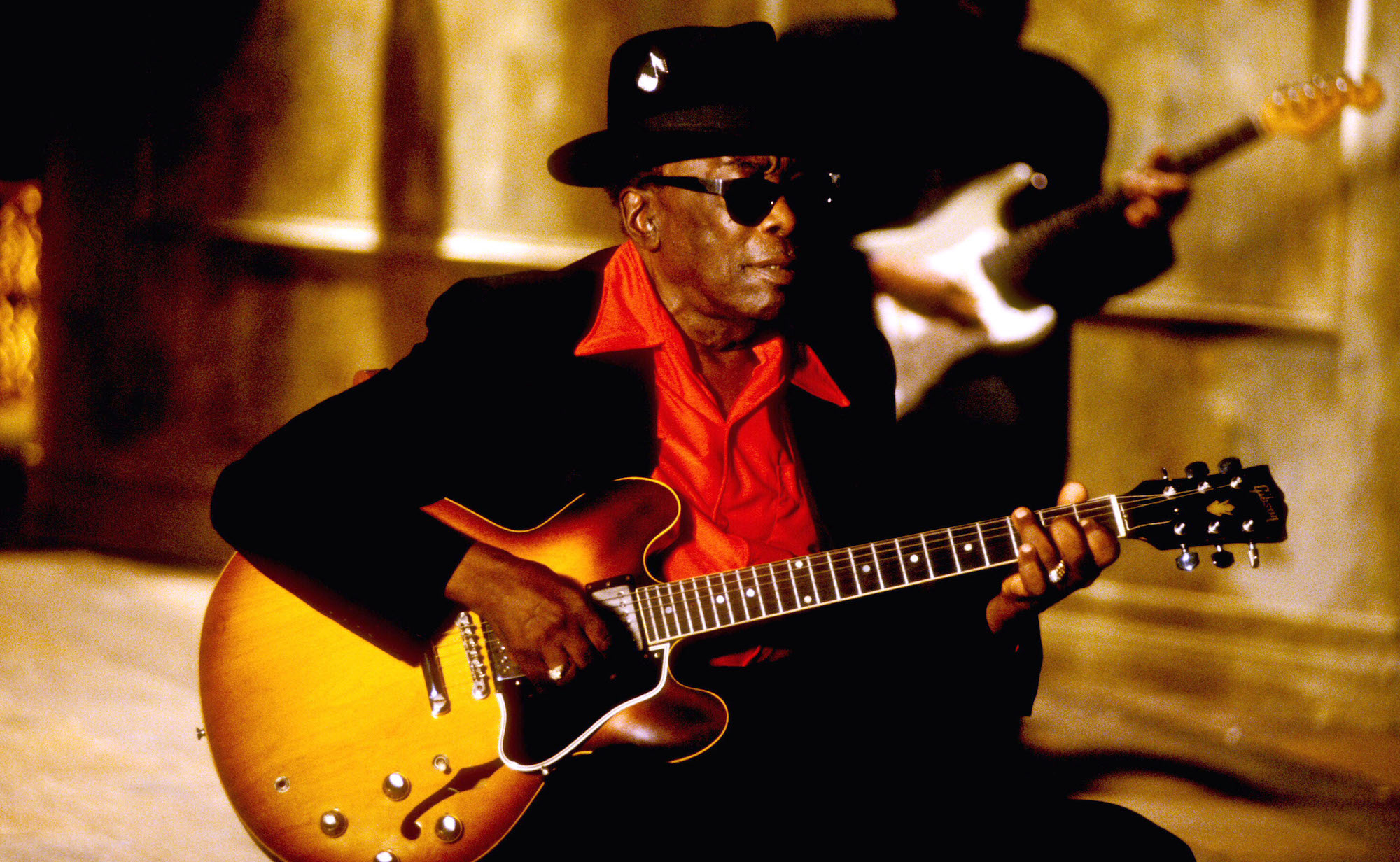
Who's come closest to playing like you?
“Let's see. Eddie Taylor is real close. He can do it. Buddy Guy can get pretty close. He can play 'Boogie Chillen'" real good. He plays it on every show. Buddy Guy is playing so well, and I'm so happy for him. He getting a lot of recognition that he should have had a long time ago, like us all of us should have gotten. He's such a beautiful person.”
Do you admire John Hammond's playing?
“Who doesn't? We've been together a lot over the years too. Now, he can play like me! [Laughs] Yeah, he can. He'll say, 'I'm gonna play like you now, just like you,' and then he plays it and starts laughing. I say, 'If someone was outside and walking up, they'd think it's me in here playing.'
“He's really a nice gentleman, an easygoing person too. He loves people. He talks to me about it a lot. We sit down together [imitates John Hammond's voice]: 'John, you know, you love people. We let them get away with things we shouldn't, but we don't want to hurt them.' That's the way he talks. I said, 'They think John Lee don't know any better, but I do.' You help people, you take them in. It all come back to you.”
Perhaps the measure of a truly great man is how he treats people day in and day out.
“Right! The little things in life, the love. I always believe in 'it comes back to you if you do something good.' I was taught that, and I think it does. You do good deeds, somewhere in life it's going to come back. You can only do wrong so long before you get it in some kind of way. That's my belief.
“So, I'm happy with my life. I had a good life, and I had a rough life – I've had both. I don't try to live in the past. I can't bring back those little things. I can't change the rough things that come through, so I look for the future. You can't live in the past – a lot of people try to live in a memory. I live for today and for people today.”
Jas Obrecht was a staff editor for Guitar Player, 1978-1998. The author of several books, he runs the Talking Guitar YouTube channel and online magazine at jasobrecht.substack.com.


